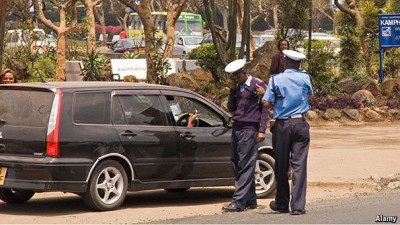IN AMERICA, a common complaint of civil-rights activists is that the police treat “driving while black” like a crime. In many countries in Africa, the same crime is simply “driving”. The trouble is not discrimination, but rather that police officers stop motorists on flimsy pretexts in the hope of extracting bribes. In Kenya, for example, motoring offences necessitate paying bail and turning up at court. Unsurprisingly, then, a police officer catching someone making a wrong turn or with a broken rear light has quite a lot of leverage. Pay a few thousand Kenyan shillings now (about $30) and maybe you won’t have to go to court. For this reason, bookshops in Nairobi all sell miniature copies of the Kenyan Highway Code that harassed drivers can pull out and use to defend themselves.
Such corruption annoys the rich (at least those who don’t themselves benefit) but makes life miserable for ordinary people. Getting a place at a good school; getting permission to build on land you own; starting a business: all can involve paying people off. The cost to newly-developing economies is tremendous. The sheer injustice of the rich buying themselves out of criminal convictions while the poor get harsh treatment, is greater still.
Yet quantifying the reach of corruption is difficult. One attempt to do so was released on December 1st by Transparency International, a Berlin-based global NGO that focuses on reducing graft. It ran a survey in 28 countries in sub-Saharan Africa in 2014 and this year to attempt to measure the level of corruption.
According to the survey, 22% of Africans who had contact with public services admit to having paid a bribe in the past year. In Liberia the figure was 69%. In Kenya and Nigeria, two of the most important African economies, it was 37% and 43% respectively. Across the region, a majority of respondents said that they thought corruption had got worse in their country in the past year. In South Africa, the figure was 83%. The most affluent respondents were half as likely to have paid a bribe as the poorest. The type of bribes most commonly paid were to police officers and court officials. Half those forced to pay such bribes had done so more than once.
A few countries, though, stood out as remarkably clean. Just 1% of those surveyed in Botswana and Mauritius said they had paid a bribe, a share comparable to that in the developed world. In the former, 54% of respondents said that they thought the government was doing a good job in fighting corruption, far more than in any other country surveyed, and 72% that ordinary people could make a difference in that fight. With a per-capita income of roughly $17,000, Botswana is also one of Africa’s richest countries.
In Kenya, by contrast, corruption seems to be holding back development. Its government has recently been caught up in a series of scandals. Public documents show ballpoint pens being bought for $85 each, and wheelbarrows for $1,000. At the same time the government is running a fiscal deficit of almost 9% of GDP, forcing it to block pay rises for teachers and spending on such things as repairing roads. Where police are harassing drivers, they are rarely the only officials with their hands in citizens’ pockets.
END


Be the first to comment